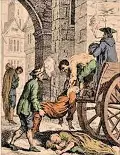King Edward III of England
Part 3: And in the End England underwent some momentous changes while Edward III was king:

It was also during the reign of Edward III that the Black Death struck England and the rest of the Europe. Conservative estimates are that the bubonic plague killed one-third of the population of Europe. Among those who died were three of Edward's children. England suffered repeat visits of the dreaded plague, in 1362 and 1369. Edward's long years of wars took their toll on his health. He became senile in 1371 and depended more and more on his third-born son, John of Gaunt, to lead the affairs of state. A new French monarch, Charles V, had established a flair for victory as well and clawed back most of the territory that his father had lost. By the late 1370s, the only French lands that England still controlled were Bayonne, Bordeaux, Brest, and Calais. 
The longer the war dragged on, the more territory France reclaimed. In 1376 came the Good Parliament, so called because it had as a goal addressing supposed corruption in the judiciary. Parliament had not met for nearly three times by that time, and the Crown badly needed funds to continue the war. The Good Parliament featured the first recorded impeachment, of Lord Latimer, who was thought to be stealing from the Treasury. John of Gaunt summoned another Parliament the following year. This one has come to be called the Bad Parliament because it declared the previously year's session, the Good Parliament, unconstitutional and had its laws voided. 
Edward's wife, Philippa, had died in 1369. The ailing, failing king soon fell under the spell of one of his wife's ladies-in-waiting and lavished her with attention and gifts, even some of his wife's treasured possessions. Edward himself died on June 21, 1377, after suffering a stroke the month before. He was buried in Westminster Abbey, having ruled 50 long and tumultuous yet momentous years. Edward, the Black Prince, had died the year before, and so succeeding Edward III on the throne of England was his grandson, who became King Richard II. Also of significance, Edward's son John of Gaunt founded the house of Lancaster and his son Edmund of Langley founded the house of York. These two houses would struggle bitterly for control of the throne during the Wars of the Roses. First page > Still Trouble with Scotland > Page 1, 2, 3 |
|
Social Studies for Kids
copyright 2002–2024
David White



 Edward created the Order of the Garter in 1348. As the story goes, Edward was dancing with a lady at a royal ball when the lady dropped her garter. The king picked it up and, instead of handing it back, tied it around his own leg, stating "Honi soit qui mal y pense", which means "Evil to him who evil thinks." This order of chivalry is still going strong, and that is still the order's motto.
Edward created the Order of the Garter in 1348. As the story goes, Edward was dancing with a lady at a royal ball when the lady dropped her garter. The king picked it up and, instead of handing it back, tied it around his own leg, stating "Honi soit qui mal y pense", which means "Evil to him who evil thinks." This order of chivalry is still going strong, and that is still the order's motto.
